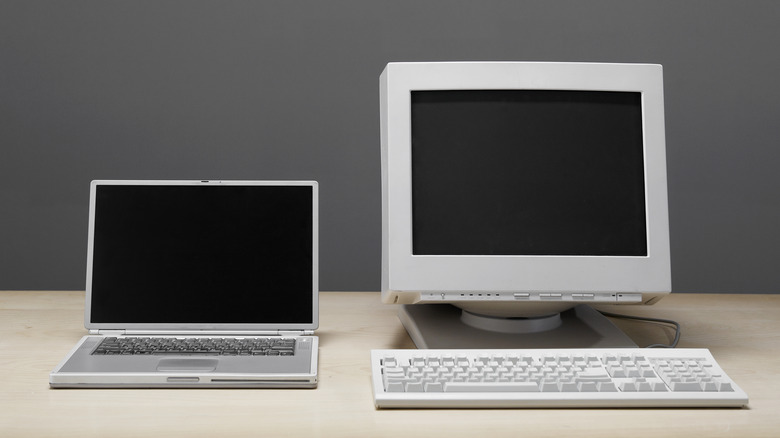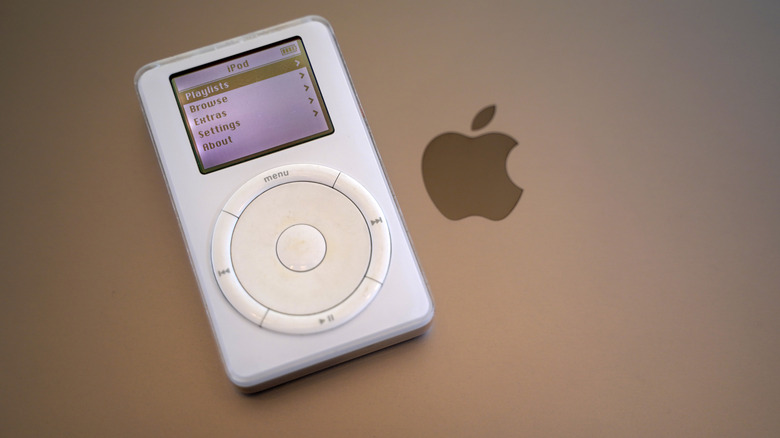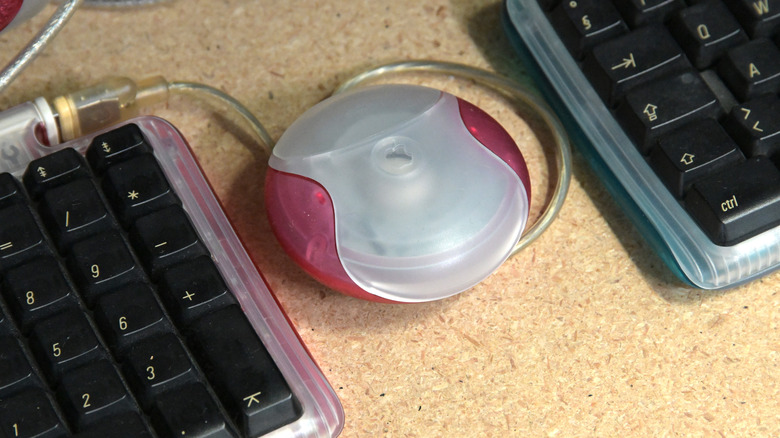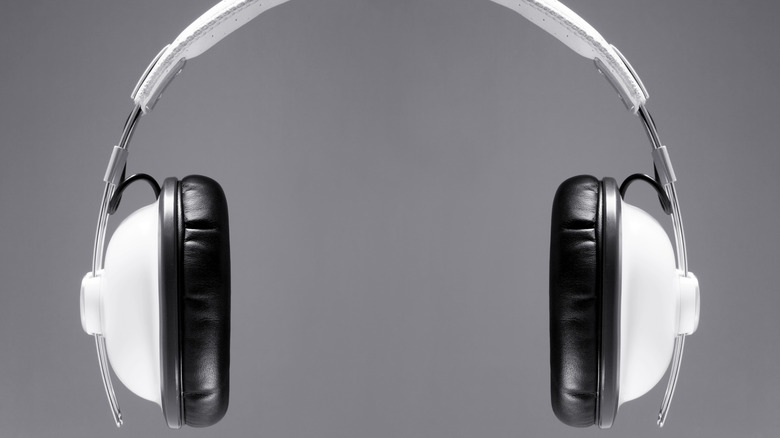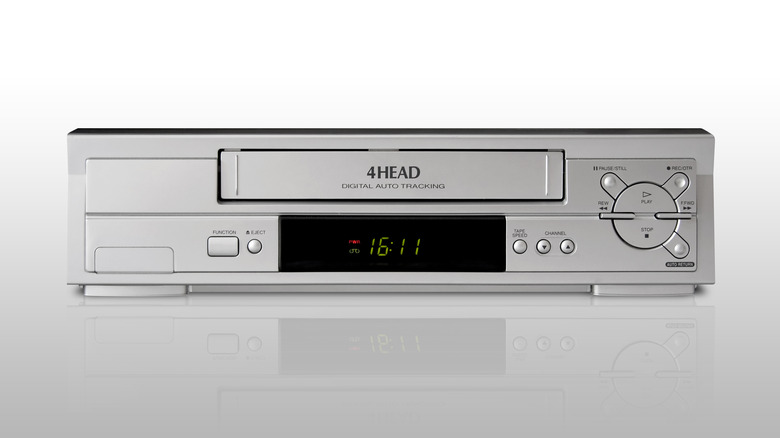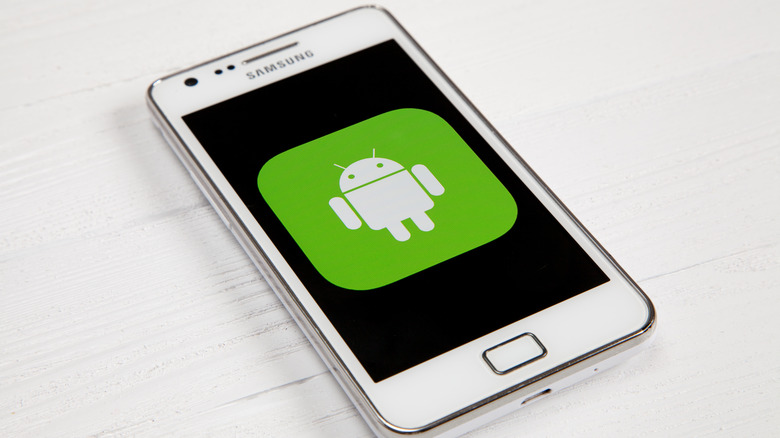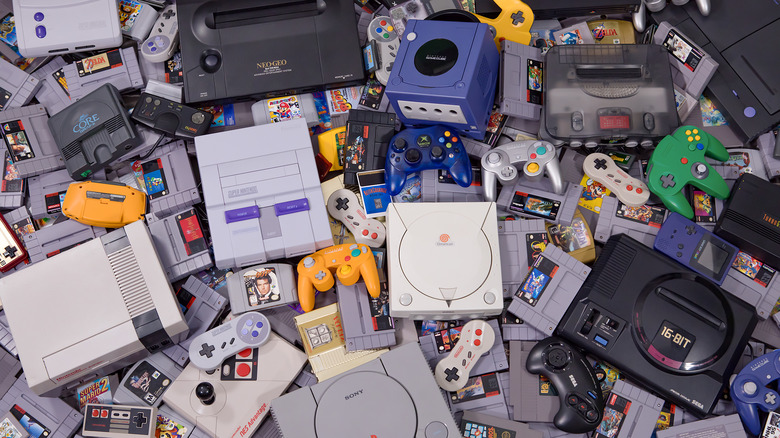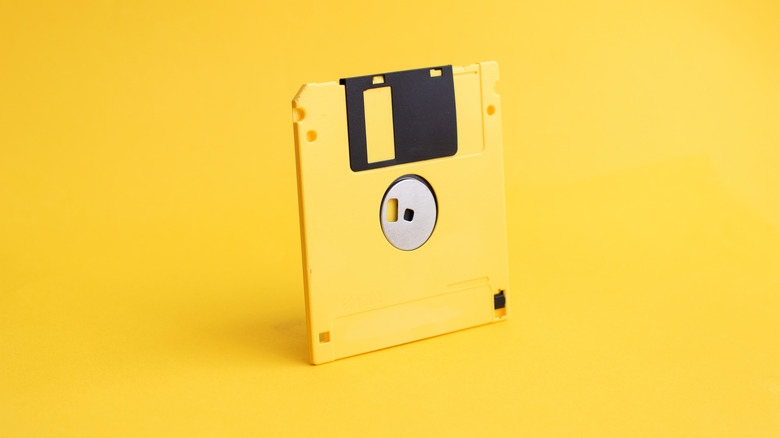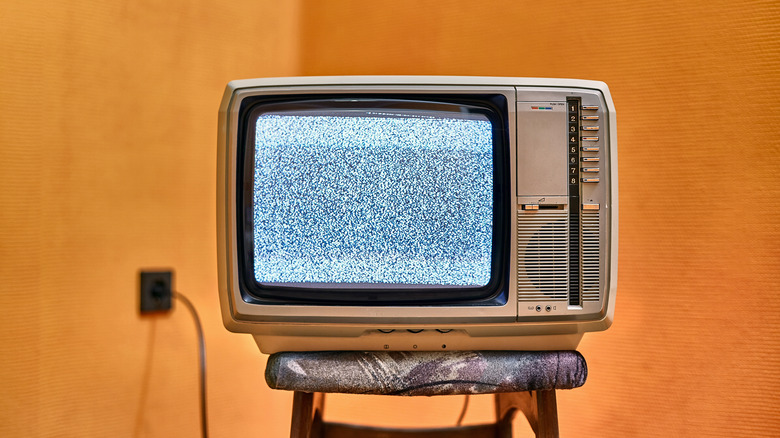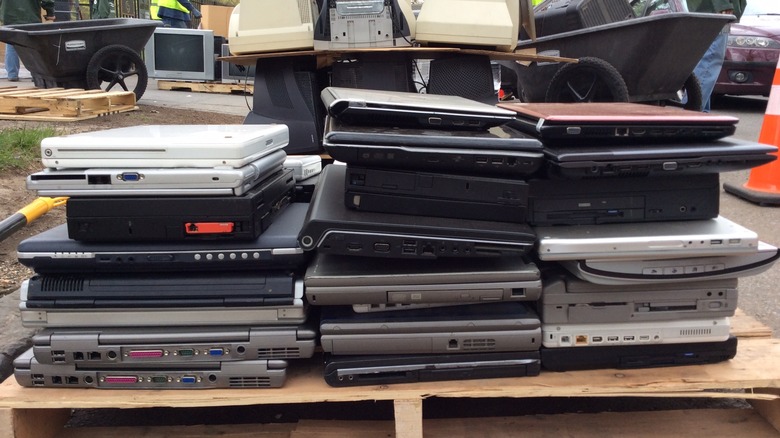5 Pieces Of Vintage Tech That Still Have Potential (And 5 You Should Never Buy Used)
Old technology is everywhere. As time marches on, technology advances further and further, which leaves older pieces of tech sometimes left in the dust. However, none of it just disappears. It's all still out there, be it with collectors, stuffed in an attic, or in the aisles of a thrift store. If you've ever dug through a pile of old tech at a thrift store, you've doubtlessly had a moment where you question whether or not a bit of vintage tech is worth buying.
It's an understandable dilemma. The allure of vintage technology is hard to deny. That allure lies not just in memories and nostalgia, but in defying the march of progress. There are those pieces of vintage tech that are absolutely worth putting a little bit of love into. Yet, amid the treasures of the past, pitfalls abound; not every relic is worth dusting off. Some vintage tech products, while once perhaps groundbreaking, are now just paperweights at best and genuinely dangerous to your safety at worst.
Unfortunately, the divide between what vintage tech still has potential and what vintage tech is better left in the past isn't always easy to see. Sometimes there is something that just seems so interesting that it might otherwise blind you to any of its potential pitfalls. Conversely, you might be overlooking a potential prize of the past. Luckily, there are some retro tech items that, more often than not, fall into one camp over the other.
Potential: iPods
It seems odd to envision the days when Apple wasn't most well-known for products like the iPhone and Apple Watch, but there was a time when Apple's killer app was the iPod. Launched by Apple in 2001, this portable music player revolutionized music consumption. Fast forward to the present, and the iPod continues to stand as a testament to the marriage of sleek design and timeless functionality.
The most obvious use for an iPod nowadays is still for music use, although it may seem a bit obtuse to pack around an MP3 player in the era of Spotify and other music streaming services. However, there is still some merit in loading up individual songs onto an iPod. Of course, there are some convenience curbs to hop with using an iPod, such as still potentially needing a 30-pin connector, and having to use wired headphones.
Moreover, the iPod's legacy extends beyond its original purpose. In an era dominated by streaming services, the iPod transforms into a stylish accessory that champions individuality. Its classic scroll wheel, minimalist interface, and pocket-sized form factor evoke a sense of compactness and simplicity that contrasts with the gargantuan devices of today.
Some of the best uses for an old iPod don't even come down to just music either. The iPod encompasses a wide product range from the Nano to the Touch, and each of the devices in the iPod lineup could still be used today for a wide range of non-music purposes. With its enduring timeless design and potential for customization, the iPod not only harks back to a musical era of the recent past but has the potential for much more.
Avoid: Computer Mice
Computer mice today are better than they have ever been. If you don't believe that statement, go to your nearest thrift store, buy the oldest mouse you can find, and use it for a day. Chances are, you're going to have one issue at best and a slew of issues at worst.
One of the more underappreciated virtues of the wealth of mice available today is ergonomics and layout. In the past, making a computer mouse seems to have been a bit more "anything goes." You can find mice that come in all sorts of horrifying shapes, none of which seem to remotely be meant for the human hand. You could also get a mouse with oddly shaped buttons, no scroll wheel, or one of Apple's many mice that come equipped with just one button. There's also Apple's quadruple whammy that has no scrolling, one oddly shaped button, and horrendous ergonomics: the Apple hockey puck.
Even if you can make it past all of the potential issues of ergonomics and layout that come with an older mouse, you will still have issues with connectivity and type of mouse. You could end up purchasing a mouse old enough that you need to take the rollerball out to clean it, and you'll also need to use it only on particular surfaces. As connectivity goes, a retro mouse is likely to be wired to a USB connection, but it could need to be connected via PS/2. If you do manage to find an older wireless mouse, be prepared for it to not use Bluetooth and instead require you to have a massive receiver hooked up to your computer. When it comes down to it, you'll probably want to stick to modern mice.
Potential: Headphones
If you've ever come down with a case of audio nostalgia for vintage headphones, the good news is that that's not such a bad thing. Yes, headphones made today do have many luxuries not afforded by those of the past, such as incredible wireless connectivity and superb ANC to go with transparency modes. But, if you just want a great pair of headphones with solid sound quality and no bells and whistles, then the past has much to offer you.
The exact charm of vintage headphones can be extrapolated from a few areas. The most important aspect, that can be appealing to this day, is their sound quality. There are many great headphones from the past that can still hold their own against some of the auditory offerings of today. There's also a uniqueness to the sound profile provided by vintage headphones that sometimes can't be found today.
Beyond their sonic virtues, another appealing part of vintage headphones for some is the look. As times change, design sensibilities do as well. While you may find some vintage headphones that don't look too far off from something sold today, some older headphones will look their age. For some, that might be unappealing. For others, that could be the draw. If there's one piece of advice to give about the visual appeal of older headphones, it's that you shouldn't let it be your deciding factor. At the end of the day, the most important aspect is going to be how they sound.
Avoid: Typewriters
There's a certain appeal to typewriters that just isn't met by computers. The charm of punching away at a keyboard while your input is produced in real time right in front of you is hard to deny. However, times have advanced, and so have typewriters. There are still typewriters produced to this day, and they are significantly better than their vintage counterparts.
The largest drawback of vintage typewriters is the maintenance and repair work that comes with them. Though sturdy enough in their heyday, vintage typewriters may show signs of wear and tear that are not easily remedied. Finding replacement parts or a skilled technician well-versed in typewriter restoration can be quite the task. Unlike modern counterparts, vintage typewriters can lack the convenience of readily available spare parts and technical support, potentially turning a charming relic into a very frustrating restoration project.
If you want to do better for your writing output, there are better options than picking up an old typewriter. For starters, you could buy a brand-new typewriter. With something that's still being made today, you'll be able to type into the future with the assurance that you can get support from the manufacturers of the typewriter for a product they're still making.
Another option available, if you're just looking to get something to write on without all of the potential distractions that come with writing on a laptop or a tablet, is a so-called Smart Typewriter. These devices look like typewriters, but rather than outputting sheets of your writing, your words are digitally displayed to you and uploaded to the cloud.
Potential: VCR
In a time where just about everything is available to be streamed directly to your device of choice, it might seem puzzling to own a VCR. However, there are still some merits to owning a VCR. One of those merits is availability. If you get your hands on a working VCR, VHS tapes are absolutely everywhere. Although VHS tapes themselves will eventually stop working, you're unlikely to reach that point yourself through moderate usage.
With VHS tapes being easy enough to get your hands on, another great perk is cost. Contrary to what some online myths would have you believe, old VHS tapes really aren't that valuable. Whichever one you just thought of, it's not. Not even the supposedly banned cover of "The Little Mermaid." Whatever your favorite movies may be, you can likely find copies on VHS at your local thrift shop for less than a dollar. Sometimes you can find places selling them for as little as a quarter.
Another great merit of owning a VCR comes in the form of the strange world of VHS tapes housing media that simply isn't available elsewhere. There are a ton of things that were put on VHS and nothing else. Direct-to-home release movies, weird self-help tapes, instructional videos, and so much more are out there. Whether you're looking to escape from owning five different streaming services, looking for a nostalgia hit, or wanting to play some old home video, there are plenty of reasons to get your hands on a VCR.
Avoid: Smartphones
There's certainly an appeal to older smartphones. Slowly but surely, smartphones have come to look mostly the same, with some small tweaks between different brands. When buying a smartphone today, it can sometimes seem like a competition between variations of the same model. Looking back at the early 2010s, there was a huge array of diversity in the smartphone world. Everything was new, and there were plenty of ideas being thrown out there. There was also a huge selection of smaller phones, which are becoming rarer and rarer every year. However, none of those things make an old smartphone worth it. One of the major limitations of older smartphones is their poor performance compared to their contemporary counterparts. If you're used to modern efficiency on a phone, going too far back in time is just going to result in unbearable performance.
Security is also an issue when considering older smartphones. With each passing year, manufacturers release updates and patches to address vulnerabilities and protect devices from emerging threats. Vintage smartphones, having reached the end of their manufacturer-supported lifecycles, often miss out on crucial security updates. This leaves them susceptible to potential exploits, compromising sensitive data and exposing users to security risks that modern devices are better equipped to handle.
One issue that can be hazardous to your health and safety is the battery in these older phones. If you've got one lying around you're considering picking back up, you might find it a little larger than when you last used it. This is a huge signal that the lithium-ion battery in the phone has failed, and this can be a huge risk. Even if you're uninterested in using an old phone, it's worth it to check for a fat battery on any old phone you have around.
Potential: Gaming consoles
If you grew up playing video games, you may find it distressing to start thinking about how old some of the games you played as a child are now. More distressing still is finding out how old the games you played into adulthood are now. Vintage video game consoles don't just encompass things like the Commodore 64 or the Atari 2600, though vintage they certainly are. Consoles like the PlayStation 2 and GameCube are over twenty years old and can now be considered vintage.
While some games have stood the test of time and made it to the modern console landscape, there are many games that simply aren't available outside of their original console release. While Microsoft can be lauded for its backwards compatibility features on the Xbox consoles that allow for many Xbox 360 games to be played, the original Xbox library that's playable on today's consoles isn't all that impressive. Worse yet is the situation with other consoles. If you have a GameCube game, there's no playing it unless you have a Wii or a GameCube around. Things only get worse when you go far back enough to be playing with cartridges.
Owning an older gaming console allows you to revisit some of the best games of the past, all the while owning a nostalgic piece of that past. While the Nintendo 64 controller may be downright bizarre, it feels equally bizarre to play some N64 games without it. For scratching a nostalgic itch, and having a genuinely good time, don't be afraid to pick up an older console.
Avoid: Floppy disks
The floppy disk stands as an iconic symbol of data storage in a bygone era. Some today might even know it exclusively as the save icon in video games rather than as a physical object. So you might be surprised to learn that the floppy disk is still around and in use to this day. While many of the industries that still use floppy disks are mostly stuck using them, you have the choice of using an outdated storage system, and you may simply choose not to. Unless you're running old software off a floppy disk, you'll be much better off leaving these far behind you.
There are many reasons not to use floppy disks. Their limited storage capacity is one of the biggest reasons. With modern data requirements soaring into the terabytes, the meager capacity of floppy disks — typically up to about 1.5 megabytes — pales in comparison. Transferring and storing sizable files on these antiquated storage devices are neither practical nor possible in most cases.
The issue of data integrity further compounds the challenges associated with floppy disks. Over time, the magnetic medium within these disks degrades, leading to potential data loss and corruption. Unlike more robust and resilient modern storage technologies, floppy disks lack the durability to safeguard data against environmental factors, making them susceptible to deterioration from humidity, temperature variations, and magnetic interference. For the most part, it's okay to yearn for something a little old-fashioned in the tech world. One major exception is in the area of data storage. You'll be far better off sticking to modern tech.
Potential: CRT TVs
Remember the days when saying someone had a flat-screen TV was meant to denote enormous luxury? Those days are now in the past, with large 4K TVs being the norm of what is available. With that in mind, it may seem odd to own a CRT TV. You may even be surprised to learn that CRT TVs are making a comeback. There are still plenty of reasons to own one, especially for those seeking other pieces of vintage tech.
Retro gaming enthusiasts, for instance, swear by the superior performance of CRTs in displaying classic video games. The absence of input lag and the ability to showcase lower-resolution content without sacrificing visual quality make CRTs the preferred choice for purists seeking an authentic gaming experience. After all, many games of the past were designed to be played on the fuzzy screens of CRTs.
Another vintage tech item that pairs well with CRT TVs is a VCR. Much like with retro game consoles, VCRs and VHS Tapes were made with a CRT TV in mind. Watching a VHS copy of a movie will look more than a little hokey on a 60-inch TV, but on a nice boxy CRT, it'll look just like you remember.
The potential of CRT TVs also extends to their adaptability for niche applications. Artists and filmmakers exploring analog aesthetics find the distinct characteristics of CRT displays appealing. The unique visual quirks, such as scanlines and blooming, contribute to a vintage charm that is difficult to authentically replicate with modern technologies.
Avoid: Laptops
Laptops are great pieces of tech, and they only get better with time. The level of sophistication and power seen in the laptops of today is insane when compared to early laptops, or even models from just ten or fifteen years ago. While saving money on a laptop by buying one that was made quite a while ago may seem like a good way to save money, the reality is that it's just not worth it.
One of the foremost challenges posed by older laptops is their diminishing performance in comparison to their modern counterparts. Technological advancements in processors, memory, and graphics capabilities have propelled newer laptops to levels of speed and efficiency that older computers, both mobile and desktop, simply cannot match. Attempting to tackle contemporary computing tasks on a dated machine often results in immensely sluggish performance, longer load times, and an overall frustrating user experience.
Laptops are already finicky enough; there can be many signs that your laptop needs repaired, and all of them can crop up all at once on an older device. Heating issues, terrible battery life, touchy ports, dead pixels, you name it, and it could be an issue on an older laptop. Going further, there's still the potentially dangerous battery issues that come with old lithium-ion batteries. Any way you slice it, you're better off buying something a little more modern if you're in the market for a new laptop. Some laptops from the not-so-distant past can serve you well. But for the most part, the best uses for an old laptop don't involve running it as a daily driver.
